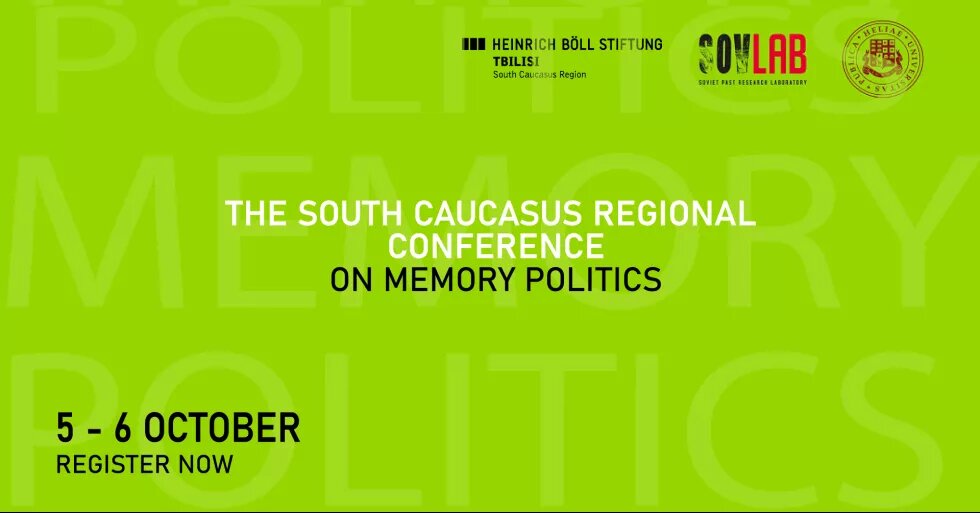Date: 5-6 October, 2020
Online Conference via ZOOM platform
Language: Georgian, English and Russian (simultaneous translation will be provided)
To attend the event please register here - https://bit.ly/2Zux3C1

Read in Georgian / Read in Armenian / Read in Azerbaijani / Read in Russian
The Heinrich Boell Foundation Tbilisi Office – South Caucasus region, together with Ilia State University and Soviet Past Research Laboratory (SOVLAB) organizes the South Caucasus Regional Conference on Memory Politics to address how the COVID-19 pandemic created challenges for researchers working in archives, museums and libraries due to limited digitization. At the same time, speakers of the conference will discuss the opportunities that digitization gives to archives, museums and research institutes to try new, innovative approaches to reach out a broader and different audiences through creating online platforms and exhibitions or using social media to exchange on memory politics. Furthermore, it will be analyzed how educational institutions in the South Caucasus responded to various problems caused by the pandemic.
During the conference, apart from COVID-19, different big crises of the 20th century will be discussed while focusing on their impact on everyday life, political discourses as well as instrumentalization of their remembrance.
By bringing together academics, researchers and students from different disciplines, such as anthropology, political science and history, the Heinrich Boell Foundation, together with its partners, supports research and discussion on the important topics of memory politics in order to rethink the Soviet and post-Soviet past and to contribute to the process of democratic development in the South Caucasus region.
Agenda
Day 1: October 5, duration: 4 hours and 45 minutes
12:00 - 16:45
12:00 - 12:15 (Tbilisi, Baku, Yerevan time)
Welcome Speech by Dr. Stefan Meister, Head of Office, Heinrich Boell Foundation and Professor Giga Zedania, Rector of Ilia State University
12:15 - 15:00 Panel Discussion: Memory politics during pandemics and other big catastrophes: Methodological approaches and practical cases
Part I - 12:15 - 13:30 - How do archives and educational institutions respond to challenges caused by COVID-19 in the South Caucasus?
Speakers:
-
Manana Ratiani, PhD, Deputy Director , National Center for Teacher Professional Development;
-
Serob Khachatryan, Professor, Department of Philosophy and Psychology, Yerevan State University;
- David Jishkariani, researcher, SOVLAB
Moderation: Dr. Stefan Meister, hbs
13:30 - 13:45 Break
Part II - 13:45 - 15:00 Presentation of digital projects on different historical periods: how important are these digital projects for wider outreach, especially with regard to reaching out and involving young people?
Speakers:
- Katja Fausser, Programme Director EUSTORY, Körber-Stiftung;
- Nikita Lomakin, Historian, International Society Memorial;
- David Leupold, Post-doctoral research fellow, Center for Middle Eastern Studies
Moderation: Dr. Stefan Meister, hbs
15:00 - 15:15 Break
15:15 - 16:45 Panel Discussion: Remembrance Culture in the post-Soviet space: how crises and catastrophes of 20th century are memorialized in the official discourse as well as in everyday life
Speakers:
- Gayane Shagoyan, Researcher at Institute of Archaeology and Ethnography, National Academy of Science, Republic of Armenia;
- Olha Martynyuk, Post-doctoral fellow, University of Basel;
- Sevil Huseynova, Social Anthropologist, Project Manager, Center for Independent Social Research CISR e.V. Berlin
Moderation: Eviya Hovhannisyan, hbs
Day 2: October 6, Duration: 3 hour and 15 minutes
16:00 - 19:15
16:00 - 17:30 Panel Discussion: The first presidents after the break-up of the Soviet Union: their role and legacy on state and identity building
Speakers:
- Professor Gerard Libaridian, University of Michigan;
- Professor Giga Zedania, Ilia State University;
- Dr. Zaur Gasimov, University of Bonn
Moderation: Tamar Gurchiani, Associate Professor at Ilia State University
17:30 - 17:45 Break
17:45 - 18:45 Ketevan Gurchiani, Professor at Ilia State University in conversation with Erik R. Scott, Associate Professor, University of Kansas on the following topic: The break-up of the Soviet Union and its impact on everyday lives of people;
18:45 - 19:00 Break
19:00 - 19:15 Sum-up of the conference
Please note:
The technical requirements for participating in an event are a computer; a tablet or smartphone; a speaker and – depending on the type of event (that is, if participants are meant to contribute) – also a webcam or a headset. It is not permitted to record such events. Online events will be held using the Zoom software, which will provide a link for participating.
To attend the event please register here - https://bit.ly/2Zux3C1
Online events will be held using the Zoom software. On first using Zoom, this access link will initiate the download of the client software. This software needs to be executed or installed (recommended) on your computer. In case you would like to avoid the download, please click on the link "join via browser". Note: This option is only available for Google Chrome and Microsoft Edge. Alternatively, use the corresponding "ZOOM Cloud Meetings" app on your mobile phone or tablet. Please join the event ten minutes before its start time.
After registering for an event, our privacy policy. The Heinrich Böll Foundation is not liable for the Zoom software.The Zoom privacy policy is available here.
